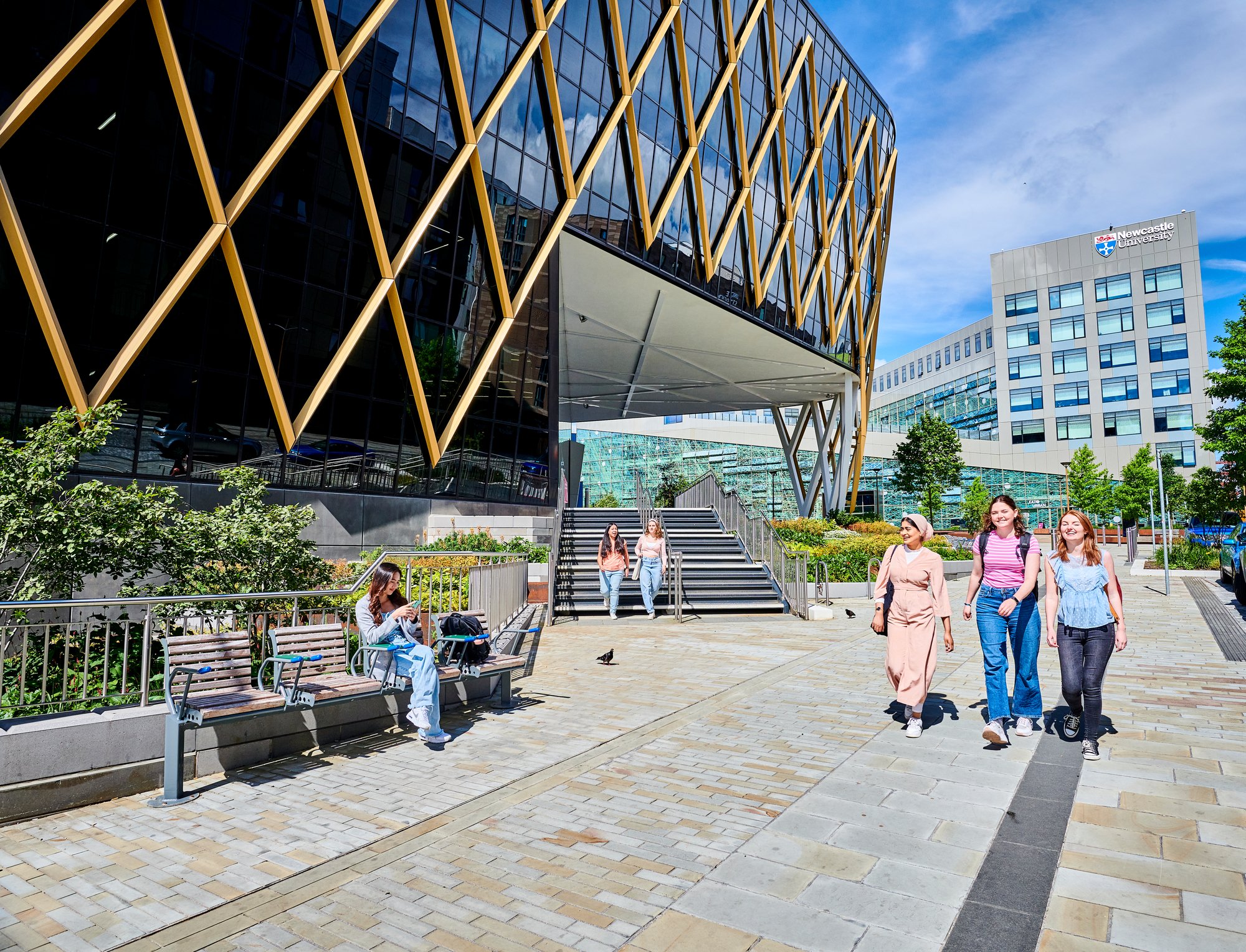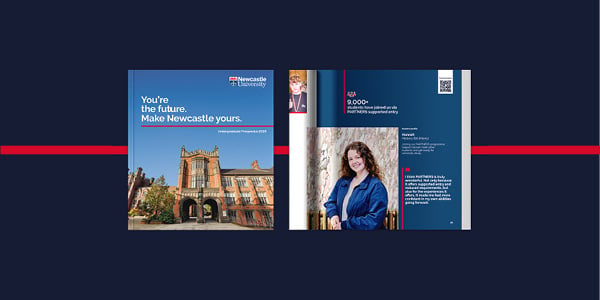Study with us | Newcastle University facilities
2 March 2026 | By: Judith Charlton | 4 min read
According to one of the most popular university ranking systems – QS World University Rankings – our facilities are five-star.
High-specification labs, innovative teaching and lecture spaces, clinical skills suites, rehearsal spaces, industry-standard workshops and studios, are just the tip of the iceberg when it comes to our Newcastle University facilities.
Read on to find out about some of our state-of-the-art facilities and subject-specific resources you’ll use during your degree at Newcastle.
Contents:
- Culture Lab
- Dame Margaret Barbour Building
- Dove Marine Laboratory
- Farrell Centre
- Great North Museum: Hancock
- Hatton Gallery
- Herschel Building
- IT services
- Language Resource Centre
- Medical School and Dental School
- Newcastle Helix
- Newcastle University libraries
- Northern Stage
- NU Farms
- Princess Royal
- Sport and Fitness Centre
- Stephenson Building
- Urban Sciences Building
Culture Lab
A hub for research in digital creative practice and film practice, the Culture Lab is equipped with industry-standard equipment and cutting-edge editing and production facilities. Students have access to an equipment loans facility, a sound studio, high-quality editing suites, a greenroom, screening, lecture, performance and events space.
Dame Margaret Barbour Building
Housing our psychology facilities including a food sensory suite, forensic interviewing suite, behaviour lab
and psychological testing cubicles.
Dove Marine Laboratory
Supporting the teaching and research of our marine scientists, the laboratory is equipped with an on-site live aquarium. It’s also home to the Dove Time Series, established in 1968 and one of the longest-running coastal zooplankton time series in the UK.
Farrell Centre
This centre for architecture and urban design is part of our School of Architecture, Planning and Landscape. It features space for events, education and research, as well as a business start-up area for recent graduates.
Great North Museum: Hancock
The Great North Museum: Hancock is a museum of natural history, archaeology, geology and world cultures. Highlights include a replica T-Rex skeleton, Ancient Egyptian mummies, and a gallery devoted to Hadrian’s Wall World Heritage Site.
The museum is also an extension of the classroom, allowing students to learn how to professionally handle artefacts and explore material collections from prehistory to modern day.
Hatton Gallery
The gallery’s permanent collection includes over 3,000 works spanning five centuries of art. Sharing the same building as our Fine Art department, it provides learning facilities and archive space, as well as hosting the degree shows for our Fine Art students.
Herschel Building
Specialising in mathematics,statistics and physics, with a cryogenics lab and dark lab for optical experiments.
IT services
Get connected and stay connected with WiFi that’s widely available in halls and across campus. And if you need help to get online, drop into one of our Connection Clinics.
Our Student Portal will help you manage your student life – view your timetable, manage your library account, and much more. Our virtual learning environment will give you 24/7 access to your reading lists, course modules, handouts and group discussions.
We’ll support your learning with ReCap, which records lectures and events so you can watch again at any time, and you can access your files and protected websites from anywhere, through our Windows Virtual Desktop.
Need software? Download the collaborative tools you need – such as Teams and Zoom – or access software for your own PC, either free or at a reduced price.
Language Resource Centre
Learn a new language or brush up an existing one at one of the foremost independent language learning centres in the UK.
Our Language Resource Centre supports learning with free self-study resources in over 100 languages, it’s equipped with 80 PCs with language learning software, 40 satellite channels in 16 languages and offers 800 foreign language films. You can also access online English language study materials.
Medical School and Dental School
One of the largest integrated teaching and hospital complexes in the UK, linking directly to Newcastle’s Royal
Victoria Infirmary.
Newcastle Helix
You'll enhance your learning through the £350 million innovation district, Newcastle Helix.
We’re working with partners to develop this living laboratory and global centre for science, technology, research and education in the heart of our city. Newcastle Helix is bringing together global companies with some of the best tech and science talent and researchers in the world to turn theory into life-changing new products.

Newcastle University libraries
No matter what degree you choose, you’re bound to spend a lot of your time in the library; and our library service is multi-award-winning.
We have four libraries: our main library, the Philip Robinson; the specialist Walton Medical Library; our Law Library; and the Marjorie Robinson Library Rooms with their innovative digital learning spaces.
Through our library service, you’ll have access to 0.8 million print books, 0.7 million e-books and 54,000 e-journals. We also hold Special Collections of rare books and manuscripts, including unique archives of historical significance.
Our libraries offer spaces to study, think, learn, collaborate and consult; they house PC clusters, offer a laptop loan scheme and provide services including a 24/7 library online enquiry service, online subject information guides, and academic and study skills support.
Northern Stage
Our on-campus theatre is the largest producing theatre in the North East of England. It produces, co-produces and supports the production of great theatre for regional, national and international audiences in live and digital forms.
NU Farms
Commercially operated, our two farms of more than 800 hectares, are used for research, teaching and demonstration.
Students gain valuable insight into how real-world farms operate, accessing facilities for our agricultural, scientific and engineering programmes.
Princess Royal research vessel
This state-of-the-art research vessel was designed as a floating laboratory for both marine scientists and engineers. Students use our vessel to carry out a range of activities, from investigating every aspect of the marine environment to handling and assessing the performance of a small craft.
The Princess Royal is supported by a marine station with facilities for staff and students to use when preparing for trips on the vessel, plus a recirculating seawater aquarium.
Sport and Fitness Centre
As one of the UK’s top sporting institutions, we’ve invested £32m in new facilities to make your sport and exercise experience even better.
Our Sport and Fitness Centre is the hub of student sport on campus. Enjoy facilities including an eight-court sports hall, four glass-backed squash courts, a high-tech 180-station gym and studio spaces with audio-visual effects, including a spin cycle studio.
Our outdoor facilities include a water sports centre that’s home to Newcastle University Boat Club, a rowing ergometer training centre, and a fantastic range of artificial and floodlit pitches, all at easy-to-access locations around Newcastle.
We also have cutting-edge sports laboratories for sport and exercise science. These include physiology and biomechanics labs, a gait track and extreme environments lab.
Stephenson Building
A £110m investment has transformed our Stephenson Building into a world-leading hub for excellence in engineering, teaching, research and partnering with industry. With innovative teaching and social spaces, workshops, laboratories, offices, computer clusters and a Maker Space, it is a facility for the 21st century and beyond.
A place for future engineers, researchers, designers and visionaries to tackle world challenges together, it hosts three hubs for our research strengths in digital manufacturing, sustainable propulsion and biomedical engineering. Read more about this extraordinary facility.
Urban Sciences Building
Home to our School of Computing, this £58m state-of-the-art building is based on Newcastle Helix.
Our students access innovative teaching at a world-leading centre in computing research, with outstanding facilities including:
- a cyber-physical systems laboratory
- PCs with Raspberry Pi3 to explore and develop computer programming and operation
- a decision theatre – an interactive 3D facility that can be used to collaborate and visualise data in different ways
Find out more
- For more subject-specific resources explore our undergraduate course profiles, or check out our postgraduate programmes
- Discover how you'll learn with us
- Explore more during an Open Day

Discover the Newcastle experience: Our Undergraduate prospectus will guide you through our world-class degrees, the support you can benefit from, and our beautiful city-centre campus.
